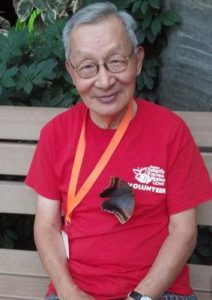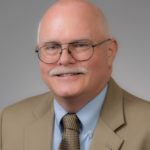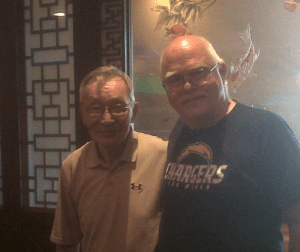Jodi’s Journal: Final lessons from a legendary professor
By Jodi Schwan
It’s a mixed blessing to find a great story within an obituary.
While I appreciate being able to pay a small tribute, I always wish I’d had a chance to meet the person.
That’s definitely the case with Dr. Chen Ho Chen, who died at age 87 recently in Sioux Falls.
I found out about him through one of our clients, the South Dakota Biotech Association.
“He was a pioneer for research,” executive director Joni Johnson told me, adding that her board chair, Kevin Kephart, “thought it would be a good idea to write a piece on the work he’s done at SDSU.”
When I talked to Kephart, a retired professor and former vice president of research and economic development at SDSU, it became apparent why.
“By and large, I don’t think people know, but his contributions are astounding and major,” Kephart said. “And he did it at SDSU and in South Dakota, and it went out and made bigger impacts around the world.”

Dr. Chen Ho Chen at the Butterfly House in Sioux Falls
But here’s where things got a little complicated. Chen had a Ph.D. in plant science. He worked on plant tissue culture – taking plant tissues and processing them, so the cells regenerate into plants.
“When you’re doing plant transformation in biotech, you’re regenerating plants from a mass of cells,” Kephart explained. “You have a collection of cells and have to stimulate them into producing a new plant. And those are the processes Chen worked out. It was just a major contribution to the sciences.”
Chen also worked in anther culture.
Look that up – which I did – and you will find the following explanation:
“Anther culture is a technique by which the developing anthers at a precise and critical stage are excised aseptically from unopened flower bud and are cultured on a nutrient medium where the microspores within the cultured anther develop into callus tissue or embryoids that give rise to haploid plantlets either through organogenesis or embryogenesis.”
See what I mean about it getting complicated?
Here was someone who had made huge contributions to his field, who had set the stage for biotech research related to plants by establishing foundational processes that allowed for widespread research and discovery.
And I knew I would struggle to explain it, much less get people to pay attention to it.
So, hopefully, you get the point that South Dakota was home to a scientist whose brilliance and dedicated research made a broad impact on his field.
Because now, I get to tell you what else I discovered about Chen. And the rest is powerful in its simplicity.
Chen was born in mainland China in 1929. His birth certificate misstated his birth date by two months, so he often joked he had two birthdays.
I would suggest he might have had a third, when he was able to leave the mainland for college in Taiwan – a path that required him to leave his parents behind and ultimately led him to the U.S., where he received a Master of Agronomy in Louisiana before coming to SDSU for his Ph.D. in plant science.
He moved a couple of times after that before returning to Brookings with his young family in 1968 to join the faculty in the biology department. From 1953 to 1994, he published more than 60 research projects.
He was a great advocate for international students, I learned from his obituary.
“It was not unusual to have extra guests at a table to celebrate special holidays,” it reads. “These students were all welcome at his daughters’ weddings, as well.”
But it wasn’t until I connected with Chen’s former student, Dave Songstad, that I realized the full measure of his impact.

Dave Songstad
Songstad is another South Dakota success story. He worked in Chen’s lab while a student at SDSU, and then went on to work for major players like Pioneer Hi-Bred and Monsanto. He currently works at a plant biotech company in San Diego.
“I believe I’m his only student that truly had a plant biotech path,” Songstad said.
Chen “is the guy who really had the first fingerprints on the whole area of plant biotech early on,” he continued. “He really was one of the pioneers.”
Together, they published papers on plant science. Songstad remembers Chen returning to mainland China in 1983. He had not been there since 1949. His parents were no longer alive. While Chen was there, Songstad made an important discovery in their lab.
“When he returned, I showed him what I’d found, and he got really, really excited,” Songstad said. “He started speaking Chinese for about a minute because he was so excited and then he realized I had no idea what he was saying.”
They stayed in touch over the years, as the relationship became more like family than one between a professor and student.
“One of the things he taught me, aside from plant tissue culture, was how to critically evaluate yourself,” Songstad said. “To self-reflect, to see if there are areas where you’re weak and then when you take the next step, see if you can change those weaknesses into strengths. He was a great mentor.”
The last time they met in person was two years ago, at the Butterfly House in Sioux Falls, where Chen volunteered up until his death.
They sat on a little bench, “And he said, ‘Dave, what I do now is visit with my daughters, I take care of the butterflies and I read my Bible,’ ” Songstad said.
Afterward, Songstad thanked him for directing him toward his career path and a successful professional life.
“I said, ‘Chen, I feel so lucky to have had you as a professor. Without you, none of this would have happened,’ ’” Songstad said. “And he smiled and looked at me and said, ‘No, Dave, I’m the lucky one for having you as my student.’ And I’ll always remember those words.”
As many of us head back to school soon, or back to work after some time away this summer, it’s important to recognize those who have taught us along the way and seek out ways we can help mentor others. While Chen’s work touched an entire industry, I bet if we could ask him, he would point to Songstad as his real legacy.
“It wasn’t about him. It was about others,” Songstad told me. “He’s a shining star of an example. If more people followed his path, it would be a better planet.”








